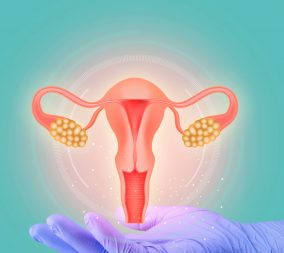So you have fibroids… Maybe you had an ultrasound to investigate pelvic pain or heavy periods, or you had imaging done for a non gynecologic reason and fibroids were noted incidentally. However they were found, now you know you’ve got them. This is a common scenario in our offices at Kamm McKenzie; once uterine fibroids are identified the obvious next questions are: what are fibroids, and what needs to be done about them!?
What are fibroids?
Fibroids are benign (non-cancerous) tumors that develop from uterine smooth muscle and fibrous connective tissue. They can range in size from very small (a centimeter or so) all the way to the size of a term pregnancy! They can develop in any layer of the uterus: the endometrial lining (the inside of the uterus), the uterine wall, or even just under the uterine serosa (the thin outermost layer of the uterus). Typically slow growing, they reach their maximum size during child bearing years, and diminish in size after menopause. Fibroids are very common, with up to 70% of women estimated to have fibroids by midlife.
What do you need to do about them?
Maybe nothing! Many fibroids cause minimal or no symptoms. Only about 25% of people with fibroids develop symptoms bothersome enough to require treatment. Symptoms generally fall into two categories: bleeding and bulk related (depending on size, location and number of fibroids, patients often have symptoms in both categories). Fibroids can cause heavy periods or irregular bleeding, especially if they contact the endometrial lining. Bleeding can be so severe or prolonged that is can lead to anemia (low red blood cells) and iron deficiency. They can also contribute to pelvic pain and pressure. Sometimes fibroids can make sex painful or uncomfortable. Fibroids can lead to urinary or bowel issues too, like urinary frequency and constipation.
Treatment for fibroids depends on their location and size, and what symptoms they are causing. There are a number of management options for fibroids including expectant management (watchful waiting), medications, vascular procedures and surgery. Surgical approaches include myomectomy, radio frequency ablation, and hysterectomy (definitive management).
If you are diagnosed with fibroids, you should talk with your provider about your symptoms, goals, and treatment options. Stay tuned for future blog posts on the surgical treatments for fibroids!
Written by Dr. Buckheit / Follow her on Instagram @calibmd


















